If you’re toying with the idea of adding the best creatine supplement — like Jacked Factory Creatine Monohydrate — to your routine, we’ll be the positive reinforcement to just do it already! Creatine is one of the safest and most well-studied supplements, touted for its ability to increase maximal strength and lean muscle mass as well as its ability to support recovery and brain health. (1)(2)(3) If you’re still on the fence, we’ll get into the nitty-gritty of everything you can expect in this Jacked Factory Creatine Monohydrate review.
I’m a CPT and I’ve been taking creatine monohydrate for the last six months. In addition to my experience with this type of supplement, we tapped registered dietitian Chelsea Rae Bourgeois, nutritionist Melissa Boufounos, and Dr. Charlie Seltzer, MD, for their insights. Our tester, a certified personal trainer, also added Jacked Factory Creatine Monohydrate to their routine, utilizing our equipment testing methodology to present you with a clear understanding of our testing. For anyone who’s looking to support athletic performance and muscle growth without breaking the bank, keep reading — because this dietary supplement may be just for you.
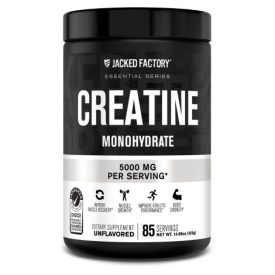
Jacked Factory's Creatine Monohydrate is about as straightforward a creatine as it comes. There isn't any added fluff or fillers, and it's one of the best prices we've found on the market for a creatine monohydrate powder.
Medical disclaimer: The content on BarBend is meant to be informative in nature, but it should not be taken as medical advice. The opinions and articles on this site are not intended for use as diagnosis, prevention, and/or treatment of health problems. It’s always a good idea to talk to your doctor before beginning a new fitness, nutritional, and/or supplement routine. Individual needs for vitamins and minerals will vary.
Main Takeaways
- Jacked Factory Creatine Monohydrate now has a third-party testing this product for purity (an improvement from the lack of testing we noticed before).
- The 5 grams of creatine monohydrate per serving is a clinically-backed dosage for most individuals. (4)
- Our tester appreciates that there is no unnecessary filler or fluff added to this powder.
Jacked Factory Creatine Monohydrate Specs
| Total Price | $29.99 |
| Type of Creatine | Creatine Monohydrate |
| Creatine per Serving | 5 grams |
| Flavors | Unflavored |
| Servings per Container | 85 |
| Third-Party Testing | Informed Choice |
| Sweetener Used | None |
Jacked Factory Creatine Monohydrate powder is a supplement that’s ideal for strength and muscle building. It increases glycogen storage in muscle, providing energy for short bursts of anaerobic activity. (6) As a result, your lifts may feel easier and you may recover faster, which can lead to increased muscle mass and performance. (7)
“Creatine supplementation is a powerhouse for strength athletes, particularly in high-intensity, intermittent resistance or power activities,” says nutritionist Melissa Boufounos. “It not only helps boost strength and muscle mass but also reduces muscle damage and enhances recovery from intense exercise. Creatine may allow athletes to tolerate more intense training periods, protect against musculoskeletal injuries, and accelerate recovery time. Plus, it offers neuroprotective benefits, making it an essential supplement for those looking to push their limits safely and effectively.” (4)(6)

The creatine monohydrate in Jacked Factory Creatine Monohydrate is the most well-studied form of creatine, with countless studies and articles that support its benefits and safety for most users. “There are many forms of creatine, but old-school monohydrate has the most research behind it, and that is what I recommend,” says Dr. Charlie Seltzer, MD.
Our tester, a certified personal trainer, added this product to their pre-workout drink (you could also mix it with one of the best protein shakes) and experienced no adverse side effects. “It mixes well, even with just water, and there wasn’t any weird taste to it,” they say. “It’s unflavored and my water just tasted like water when it was mixed in.”
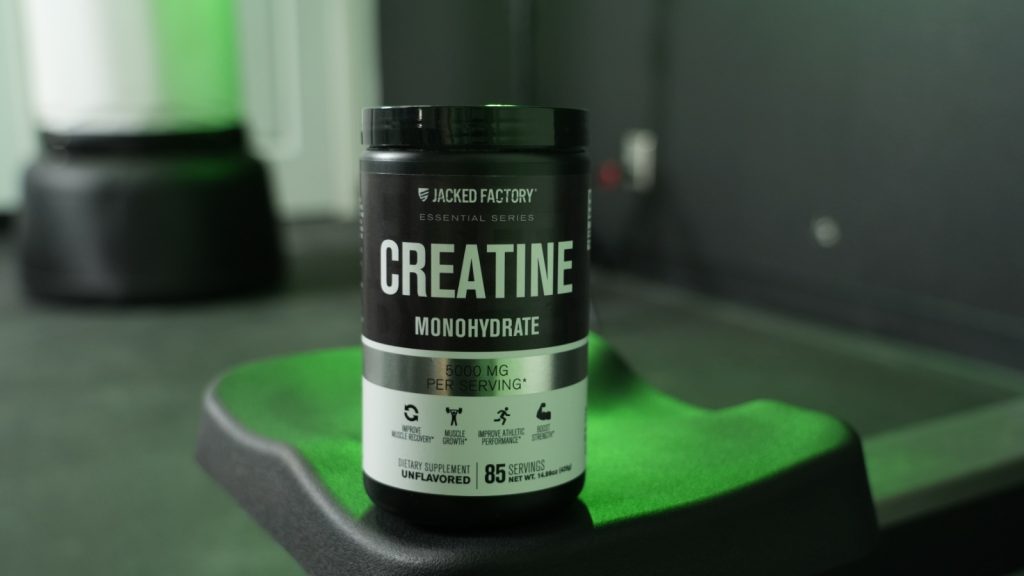
Each container comes with 85 servings of 5,000 milligrams (aka 5 grams), so the entire tub should last most users a little more than two months. This is a clinically recommended dosage, although some users may want to consider a loading phase of 0.3 grams per kilogram of body weight per day for about a week. For example, for someone who weighs 130 pounds (about 59 kilograms) their loading dosage might look like 18 grams of creatine per day during their loading phase. (4)(5)
This high-quality pure creatine monohydrate powder is just creatine monohydrate. It’s free from fluff, food dyes, and additional ingredients. “You get exactly what you pay for,” says BarBend expert contributor and registered dietitian Chelsea Rae Bourgeois, “Creatine without any alarming or unnecessary fillers.”
Who Should Use / Who Shouldn’t Use Jacked Factory Creatine Monohydrate
With a market saturated to the brim with supplements — from greens powders to the best pre-workout supplements — knowing which product is best for you can be tricky. The following are the types of people we think would and wouldn’t benefit from adding this powder to their wellness routine.
Recommended for:
- Bodybuilders and active individuals wanting to increase strength and muscle size
- People looking for a third-party-tested creatine sports supplement
- Gymgoers who want a creatine powder without added fluff
- Older adults interested in sharpening their cognitive abilities
Not Recommended for:
- People with pre-existing kidney issues (4)
- Individuals who can’t commit to consistent use of this supplement
- Athletes who want a creatine that includes additional workout supplement ingredients to support their pre- and post-workout (those folks might want to opt for one of the best pre-workouts with creatine)
Our Experience Using Jacked Factory Creatine Monohydrate
Picture this: I’d plateaued in climbing and with my weightlifting routine, stuck on the same routes and the same weights for months. I was sticking to my programming, logging plenty of hours of sleep, and getting enough protein, with the help of some of the best protein powders — but my gains were stuck in neutral. That’s when I started adding creatine to my routine and my progress jolted out of its stand-still. Once again, I started seeing benefits in the gym and my sport.
I haven’t tried this specific creatine monohydrate, but our tester, a certified personal trainer and CrossFit level-1 coach, added this to her routine. To provide you with the clearest understanding of our findings, we’ve utilized a scale of 1 (bad) to 5 (we love it) in categories such as taste, side effects, formulation, and more. The following are key takeaways from our testing.
Ingredients and Formulation
“While Jacked Factory offers an affordable creatine product, that’s exactly what you get. There are no other performance-supporting ingredients included,” says BarBend expert contributor and registered dietitian Chelsea Rae Bourgeois. “Jacked Factory Creatine Monohydrate easily gets a 4.5 out of 5 for formulation.”
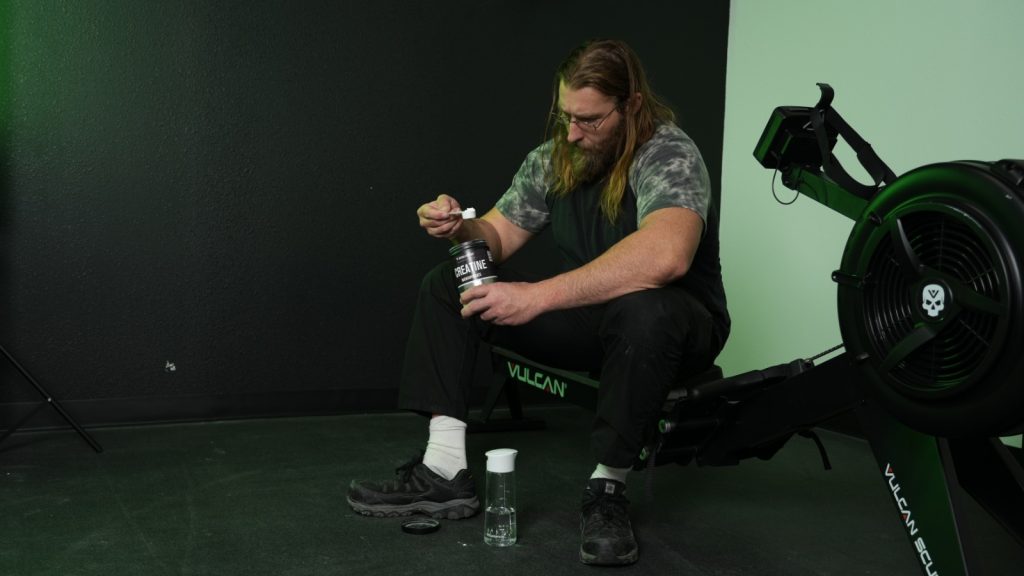
Creatine monohydrate is the only ingredient in this product, which may be ideal for those who already have an assortment of the best BCAAs, pre-workout, and other supplements incorporated into their daily routine. “You’ll need to stack supplements if you need anything in addition to creatine,” says Bourgeois. So for those who want a one-stop-shop powder that also has other muscle-building supporting ingredients, this won’t be the ideal solution.
Taste and Solubility
I prefer to mix my creatine into my protein shake, but our tester, a certified personal trainer, added this straight into a glass of water to see how well it dissolved and how good (or bad) it tasted. “Some supplements will be advertised as ‘unflavored,’ but you’ll still get a slight chemically aftertaste from it,” says our tester. “However, when I mixed this into water, all I could taste was water.” This makes mixing it ideally suited for whatever flavor profile you like since the creatine won’t affect the flavor of your beverage. Taste scores a perfect 5 out of 5.
Our tester also appreciates how well this powder dissolves in water. “The only thing I’ll mention is that when I left the cup sitting for a while, some of the product collected at the bottom of the glass,” they say. Solubility scores a 4 out of 5.
Price Per Serving
Rated as one of the best creatine for women (and people of any gender, let’s be real), each serving of Jacked Factory Creatine Monohydrate comes out to just $0.35. A week’s supply could cost you as little as $2.50, and with 85 servings per $29.99 container, you’ll be set for months to come. Price per serving scores a 5 out of 5 with our tester.
Third-Party Testing
“While Jacked Factory is a pretty transparent company, there isn’t any third-party testing to back up their claims of what’s in this product,” said our tester when they first tried this creatine supplement. However, since then, the brand has upped the ante and now includes Informed Choice testing for this product.

Initially, we gave third-party testing a score of 3 out of 5, but have since increased our score to a 4 out of 5. Informed Choice is an excellent step in the right direction, but unlike Informed Sport, they only test a few batches instead of every product batch. For elite athletes and individuals subjected to strict drug testing protocols, this may not be the safest testing certificate to abide by. However, we love it when a brand listens to customer concerns and evolves, and such is the case with Jacked Factory’s inclusion of third-party testing.
What to Consider Before Buying Jacked Factory Creatine Monohydrate
Picking out the right supplements to support your goals can be a real struggle — from whey protein, greens powders, amino acids, pre-workouts, and more, there’s a huge market for health and wellness supplements and it’s hard to know what’s worthy of your cold hard cash. After testing nearly 50 different types of creatine, we’ve rounded up some considerations to help you land on whether or not this product is right for you.
- Value: “Jacked Factory Creatine Monohydrate contains a whopping 5 grams of creatine per scoop, and at a fraction of the cost compared to other brands,” says Chelsea Rae Bourgeois, BarBend expert contributor and registered dietitian. While this product is budget-friendly at $0.35 per serving, consider how much you’re willing to spend when perusing your options.
- Only One Ingredient: There’s only creatine monohydrate in this product, which can be ideal for some users. However, you may want to consider if you’d like to invest in a different product that includes multiple performance-supporting ingredients.
- Dosage: Studies have shown that most users will benefit from a daily dosage of creatine between 3 and 5 grams. (4) With this in mind, make sure the options you’re considering provide a suitable serving size for you.
- Type of Creatine: There are nine different types of creatine. While we recommend creatine monohydrate over the rest, you may want to consider your options.
- Side Effects: Consider the potential side effects. Some users have reported bloating and gastrointestinal issues, but this tends to be during the loading phase of supplementation. Additionally, creatine causes water retention, which can cause your weight to temporarily increase. (8)
Jacked Factory Creatine Monohydrate Vs. Competitors
To help you further dial in on the right creatine for you, we’ve selected two competitors to go toe-to-toe with Jacked Factory. In the table below, you’ll find specs for Jacked Factory Creatine Monohydrate, Swoly Creatine Gummies, and Nutricost Creatine Monohydrate.
| Jacked Factory Creatine Monohydrate | Swoly Creatine Gummies | Nutricost Creatine Monohydrate | |
| Price Per Serving | $0.35 | $1.17 | $0.31 |
| Type of Creatine | Creatine monohydrate | Creatine monohydrate | Micronized creatine monohydrate |
| Form | Powder | Gummies | Powder |
| Creatine per Serving | 5 grams | 4 grams | 5 grams |
| Servings per Container | 85 | 30 | 100 |
| Third-Party Testing | Informed Choice | Yes (but lab is unlisted) | Yes (but lab is unlisted) |
With Jacked Factory providing one of the most wallet-friendly price tags, we opted to include Nutricost Creatine Monohydrate in this comparison since it provides an even larger amount of savings. Nutricost is a hair less expensive than Jacked Factory. Nutricost Creatine Monohydrate is the first creatine product I used, and I liked that it had 100 servings in the container so I didn’t have to think about replenishing my creatine for months.
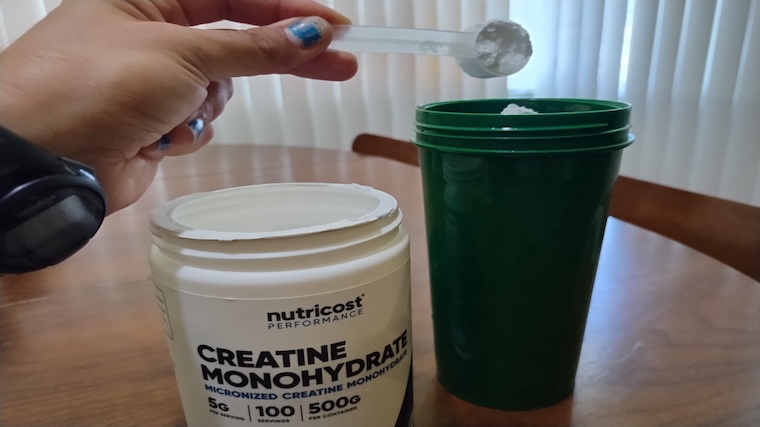
We included Swoly Creatine Gummies in this chart because we wanted to provide you with a fun candy-like option for your creatine supplementation. However, Swoly Creatine Gummies cost almost four times as much per serving as Jacked Factory, so it isn’t necessarily a budget-friendly option. Also, you’ll only get 4 grams of creatine per serving from Swoly — but that’s still within the recommended 3 to 5 grams per day dosage. (4)
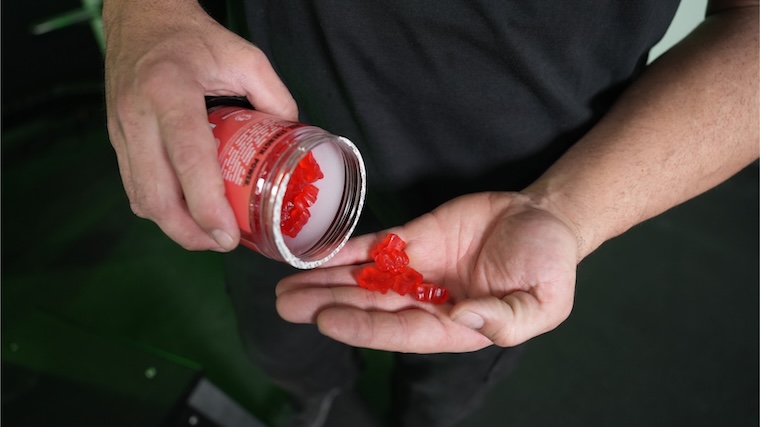
All three options are worthwhile to consider, and as such, they’re each featured on our list of the best creatine for men roundup.
When it comes to third-party testing, each of these creatine supplements offers a form of this. However, we prefer Jacked Factory’s transparency over Nutricost and Swoly — in addition to the manufacturing of this product in a cGMP-certified facility, Jacked Factory uses Informed Choice for its third-party testing, whereas Nutricost and Swoly’s third-party testing is unlisted.
Places to Buy Jacked Factory Creatine Monohydrate
You can buy Jacked Factory Creatine Monohydrate on Amazon, from Healthy Planet, and from the Jacked Factory website.
Customer Experience and Brand Reputation
When ordered from the Jacked Factory website, you’ll get free shipping in the USA and a 90-day money-back guarantee if you’re not completely satisfied with this product. If you need to get in touch with Jacked Factory’s customer service, you can reach them by email at support@jackedfactory.com or by phone at 1-877-250-5237.
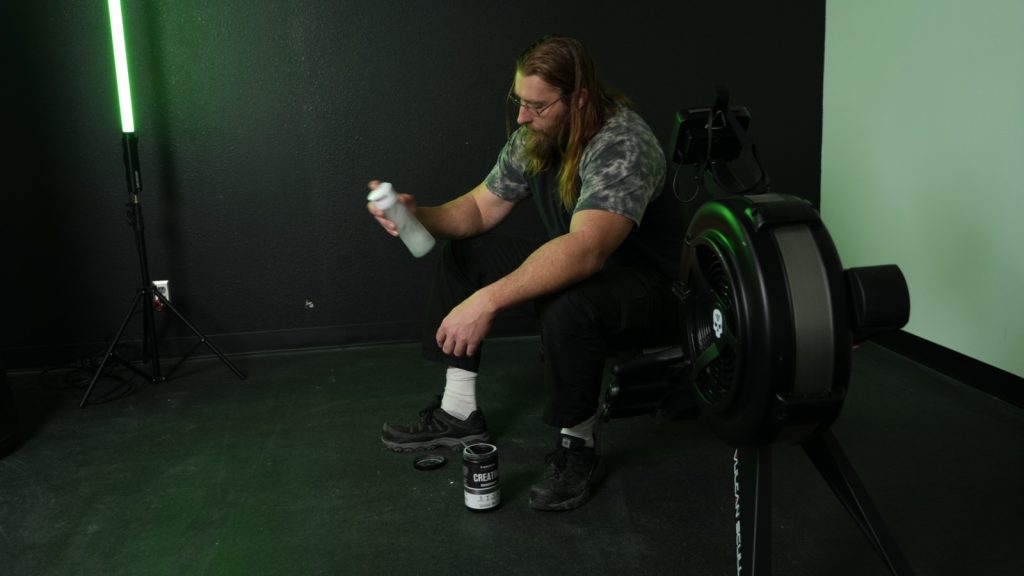
This product, at the time of this writing, has 4.6 stars out of 5 and 9,801 customer reviews on Amazon. Customers appreciate the cost, mixability, effectiveness, taste, and quality. While there’s a lot of disinformation out there about creatine side effects, it’s worth noting that 14 reviews — a small batch when compared to the total amount of users — did mention they experienced bloating or GI issues when using this product.
Our Final Verdict on Jacked Factory Creatine Monohydrate
Jacked Factory Creatine Monohydrate is simple, reliable, and cost-effective. There aren’t any added ingredients, just pure creatine monohydrate, so you can easily add this to your current supplement stack. “Creatine is the one supplement I recommend to most athletes of all ages — and even to people in general — because of its wide range of benefits beyond just performance. It can enhance strength, boost muscle mass, aid recovery, and even offer neuroprotective benefits,” says nutritionist Melissa Boufounos.
For anyone looking to get a leg up on the competition, or perhaps just aiming to survive yet another leg day, Jacked Factory Creatine Monohydrate can help give your muscles some extra fuel to support your strength training routine and recovery. (1) While this supplement won’t do the work for you — you’ll need to start up or continue your training routine — it can be the extra little bit of help you need to lift heavier weights, climb higher grades, or level up your sports performance.
FAQs
How much does Jacked Factory Creatine Monohydrate cost?
The Jacked Factory Creatine Monohydrate tub of 85 servings costs $29.99, which breaks down to about $0.35 per serving.
Is Jacked Factory Creatine Monohydrate pure?
Yes. Jacked Factory Creatine Monohydrate powder features a single ingredient — just creatine monohydrate — without any added fillers, dyes, or other additives. It’s third-party tested and Informed Choice certified for purity.
Are there any side effects of Jacked Factory Creatine Monohydrate?
Some users have reported bloating and digestive issues, but this tends to be a side effect that’s limited to the loading phase of supplementation. Additionally, due to the nature of creatine, water retention may also cause weight gain. (8)
References
- Wax, B., Kerksick, C. M., Jagim, A. R., Mayo, J. J., Lyons, B. C., & Kreider, R. B. (2021). Creatine for Exercise and Sports Performance, with Recovery Considerations for Healthy Populations. Nutrients, 13(6), 1915. https://doi.org/10.3390/nu13061915
- Hall, M., Manetta, E., & Tupper, K. (2021). Creatine Supplementation: An Update. Current sports medicine reports, 20(7), 338–344. https://doi.org/10.1249/JSR.0000000000000863
- Roschel, H., Gualano, B., Ostojic, S. M., & Rawson, E. S. (2021). Creatine Supplementation and Brain Health. Nutrients, 13(2), 586. https://doi.org/10.3390/nu13020586
- Antonio, J., Candow, D. G., Forbes, S. C., Gualano, B., Jagim, A. R., Kreider, R. B., Rawson, E. S., Smith-Ryan, A. E., VanDusseldorp, T. A., Willoughby, D. S., & Ziegenfuss, T. N. (2021). Common questions and misconceptions about creatine supplementation: what does the scientific evidence really show?. Journal of the International Society of Sports Nutrition, 18(1), 13. https://doi.org/10.1186/s12970-021-00412-w
- Hall, M., & Trojian, T. H. (2013). Creatine supplementation. Current sports medicine reports, 12(4), 240–244. https://doi.org/10.1249/JSR.0b013e31829cdff2
- LeWine, H. E., MD. (2024, March 20). What is creatine? Potential benefits and risks of this popular supplement. Harvard Health. https://www.health.harvard.edu/exercise-and-fitness/what-is-creatine-potential-benefits-and-risks-of-this-popular-supplement
- Kreider RB, Stout JR. Creatine in Health and Disease. Nutrients. 2021 Jan 29;13(2):447. doi: 10.3390/nu13020447. PMID: 33572884; PMCID: PMC7910963.
- Powers ME, Arnold BL, Weltman AL, Perrin DH, Mistry D, Kahler DM, Kraemer W, Volek J. Creatine Supplementation Increases Total Body Water Without Altering Fluid Distribution. J Athl Train. 2003 Mar;38(1):44-50. PMID: 12937471; PMCID: PMC155510.